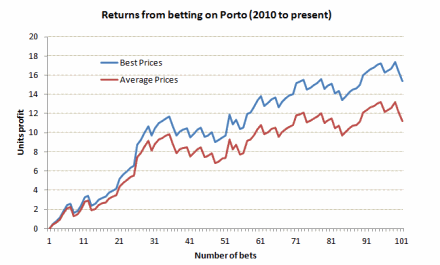A Little Bit More About Chance
Posted 28th November 2013
On a forum post asking which teams lost you the most money, it was apparent from the comments that there was little understanding of the roll of chance in sports betting. I've already looked at the methods we can use to separate luck from skill in the context of match prediction. Here, I though it would be useful to reproduce my contribution to the forum discussion.
"Don't get me started on Liverpool", "Inter sucks", "It's not the best time to bet on big teams", "What is going on with Ajax?" and "looks like god likes bookmakers and hates gamblers" are all comments that would suggest punters somehow feel a conspiracy is working against them when bets they believed just had to win actually failed to do so. Some of this conspirancy will be the perception that games are fixed. Whilst it is undeniable that match fixing does take place - indeed it's once again prevalent in the news this week with arrests in the UK - for the vast majority of games, fixing will have nothing to do with it at all. What, then, is leading punters to feel hard done by when a bet goes against them? Really, it's just a simple misunderstanding of the role of chance.
The most recent comment was about Porto: "A big F... What's wrong with them, twice on few days." I decided to actually analyse how Porto had been performing. Since the 2010/11 season Porto have been the dominant force in the Portuguese Premier League, winning the title for the last 3 seasons and currently leading this season's campaign. In fact the have lost just once in 100 games, away to Gil Vicente on the 29th January 2012. What follows is my response to the comment.
Nothing's wrong with them. In fact had you backed them every league game since the start of 2010/11 since when they have won the league every year, you would be handsomely in profit, with a double digit yield even at average market prices.

OK, so they've failed to win twice in a row.
They've done that once before in this sequence of 100 league games back in September 2011.
If the odds are to be believed as being an accurate reflection of "true" chances, then there was about a 5% chance that Porto would fail to win both of these games.
On average, based on the odds, there is about a 28% chance that Porto won't win a league game, and about a 7.8% chance they won't win 2 in a row. Since there were 99 possible ways Porto could fail to win 2 in a row from this sample of 100 matches, on average we'd expect to see Porto fail to win 2 in a row about 7 times during the course of 100 league matches. The fact that they've done this only twice is testament to how damn good they've been over the past 3 and a half seasons and how despite the bookies shortening their prices (from a rolling seasonal average of 1.5 down to 1.4) this still hasn't been enough to stop anyone betting on Porto every league game from making a profit.
Of course, none of this helps us know what will happen in the future.
But the fact that Porto have just failed to win 2 in a row is simply a matter of bad luck, as it will be with any other team which isn't involved in fixing matches. In this case, the good luck that punters would have had with Porto since 2010 is more than enough to make up for this little setback.
Just to be clear, I'm not trying to suggest that betting on all Porto's league games is an intelligent strategy. The fact that i has been profitable since 2010/11 is merely a consequence of chance. Porto have simply been better than the bookmakers could ever have foreseen. OK, so they could have shortened their odds more over time, but then who's to say then that had they done so Porto would have failed to win more games. We can't know.
Of course whinging about a couple of losses for teams you think should win, or indeed crowing about a couple of wins that you think were great bets to take, is no more sensible than believing that rolling double 6 in backgammon was preordained. Based on the bookmakers odds, Porto should have failed to win twice in a row about 7 times since the start of the 2010/11 season. About a third of the time we might expect 6 or fewer, 10% of the time 4 or fewer, and about 1.5% of the time 2 or fewer. In statistical terms, this is not beyond the realms of realistic chance. Alternatively, all the bookmakers have done is underestimate just how good Porto have been for 3 years. But the fact that they underestimated them is simply a matter of chance.
Should we expect to see this profitable trend continue? Probably not (but who knows). The more Porto keep winning, the more the bookmakers will shorten their odds. They've been doing that already. Their average price in 2010/11 was 1.52. For 2011/12 this had fallen to 1.48 and by 2012/13 it was down to 1.43. After 10 matches this season it's just 1.32 although they haven't yet played either Sporting Lisbon or Benfica. But whether and how quickly the bookmakers get it right is simply a matter of chance.
I guess that most punters intuitively understand all of this, but when something happens that they just can't believe it is easier to blame some real (but unkown) cause rather than to just accept it's simply the roll of probability.
|






